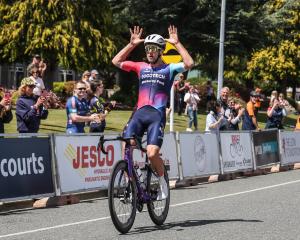Eric Murray went out and had a hit around Tirau Golf Club with Mahe Drysdale recently.
He hit in the low-90s, Drysdale somewhere in the mid-80s. A thought occurred to Murray: if they put as much time into their golf as they did their rowing, they would be playing off scratch before long.
A thought occurred to me: if they put as much time and effort into particle physics as they did rowing, the Higgs boson would have been discovered a lot earlier.
Eric Murray (30) is one half of the pair with Hamish Bond (26).
They arrive at the Olympic regatta on Dorney Lake as overwhelming favourites to win gold.
There are two reasons for that. Firstly, they have never been beaten across the finish line as a pair. Secondly, their closest rivals have given up, with Andy Triggs Hodge and Pete Reed instead being placed in Great Britain's four.
You would think that sort of expectation would begin to weigh heavily, but there is no sag in these shoulders.
"That's what happens when you're successful," says Murray.
"God, the All Blacks get expectation on them every week. You've got to win, got to win, got to win. People just expect them to and when they don't they blame this person, blame that person.
"For us, we've just got to put all the preparation in. From now on there's not a lot more we can actually do."
Except row their boat really fast for 2km. The thing is, they know they're going to do that. It's not arrogance; it's just what all their training, preparation and past performances have told them.
They know they are going to go fast and they know they are going to be hard to beat.
If someone, like the Canadian pair of Scott Frandsen and Dave Calder, comes from nowhere and puts down the performance of their lives it might be close, but they are still going to back themselves to figure a way to get across the line first. It's what they did every time they stared down Triggs Hodge and Reed.
"We can take anyone else's destiny and do anything with it," Murray says of the British pair's decision to cut their losses and move back to the four. "If they perceived it was better to be in the four, then good on them. I guess for us it was great having them there because we were always trying to beat them. The rivalry was actually really good."
Bond said they were able to feed off the British media's promotion of the rivalry.
"Because [they] kept saying they were going to beat us and we were like, 'No way, bugger off'. I don't know if it was coming from them or not, but we perceived it to be coming from them. It helped us."
Bond does not seem like the sort that needs kidology to keep him motivated, but as they say on the sea, whatever floats your boat.
The absence of the Brits does not mean complacency has crept in. Already Murray sees new challengers - and challenges.
"The British and us were out in front," Murray said. "We were clear on third and fourth, fifth and sixth. What's happening now is they're seeing how fast we're going and they've stepped it up.
The pair has a language all of their own on the water and it usually consists of one-word prompts. Murray is the caller, as Bond would have to turn his head to be heard.
"They would be completely meaningless to anybody else, but I know what he means," Bond says. "They're just key words, I guess, as far as our technique is concerned and what we want to focus on."
For eight months of the year they live in each other's pockets.
The other four months they might bump into each other by chance - Cambridge is a small town, after all - but they do not seek each other out.
For a pair that have a shared language, a burning desire to win and go fast, and an uncanny knack of knowing when the other one needs picking up, they do not, according to someone who knows them well, have a lot else in common.
"Not really," Murray says.
"Two completely different lives. I'm married with a child and Hamish has got his partner and we do completely different things around Cambridge.
"And we're with each other five or six hours a day," Bond chips in. "We've got enough time to talk to each other during the day without making more of it."
Bond says there are days he wakes up and the thought of seeing a boat or even water repulses him.
"But that's what makes champions. The ability to say: 'Let's go and do it again.' Those are the rows that really count. The ones when you don't want to be there.
"It's easy when it's easy, but to be able to go out there and work hard and try and go faster when it's not fun and it's not enjoyable, that's probably the making of a fast crew."
Complacent? Doesn't sound like it, does it?












